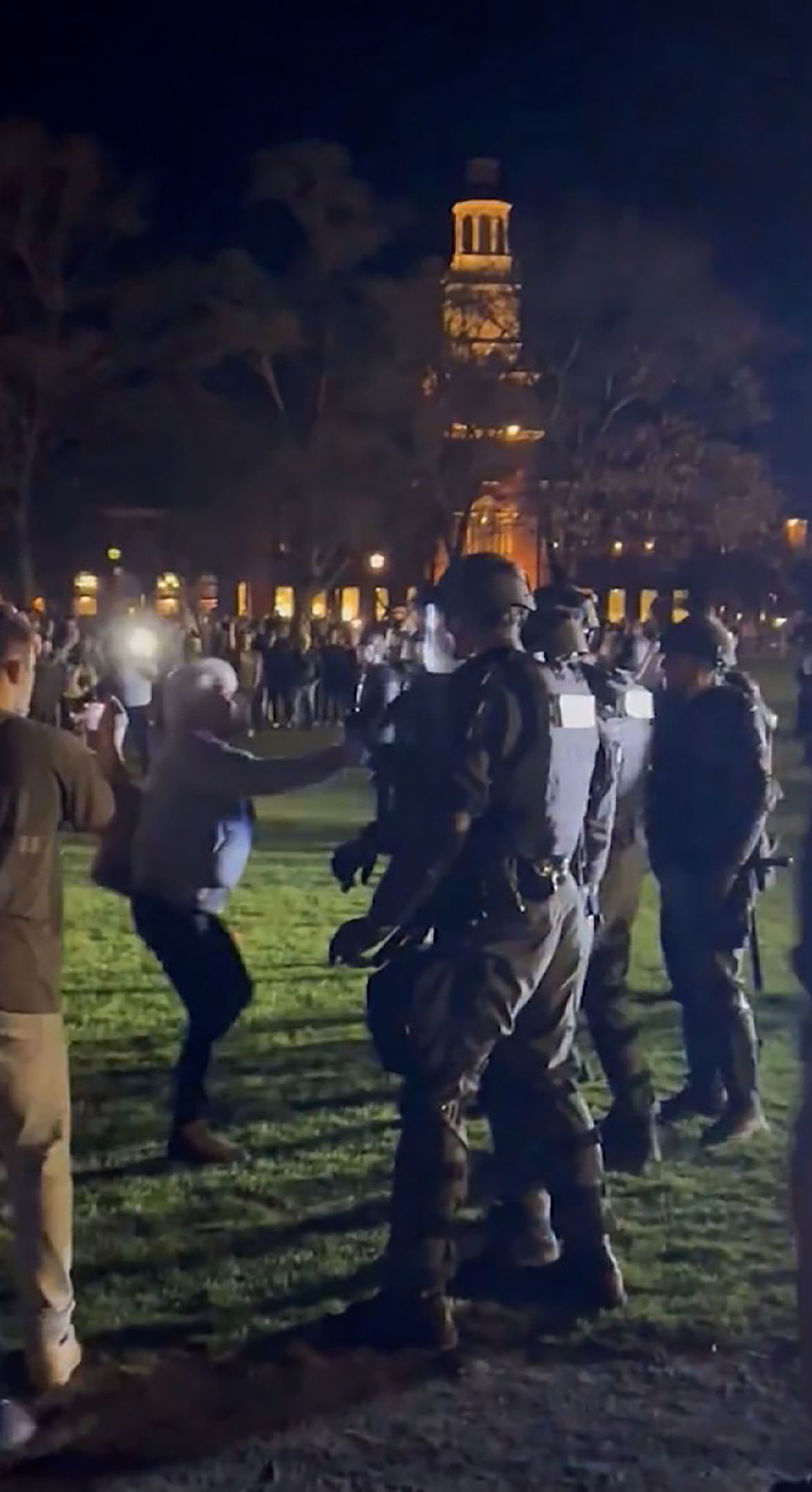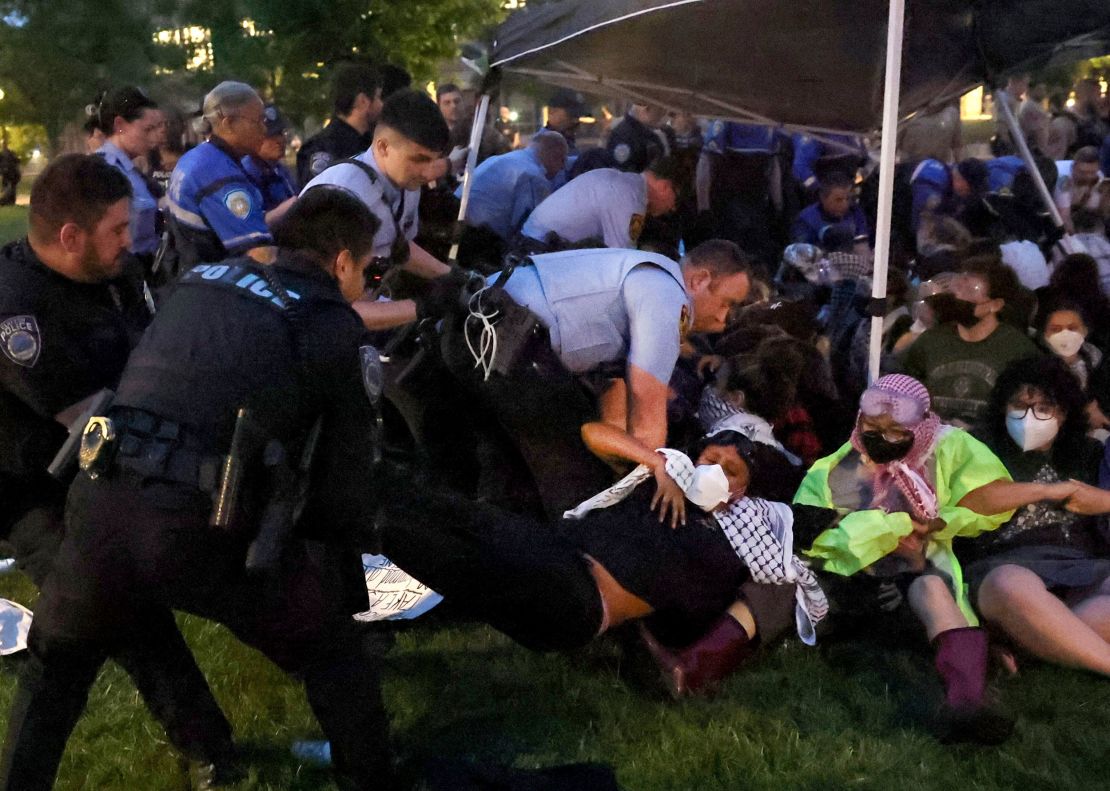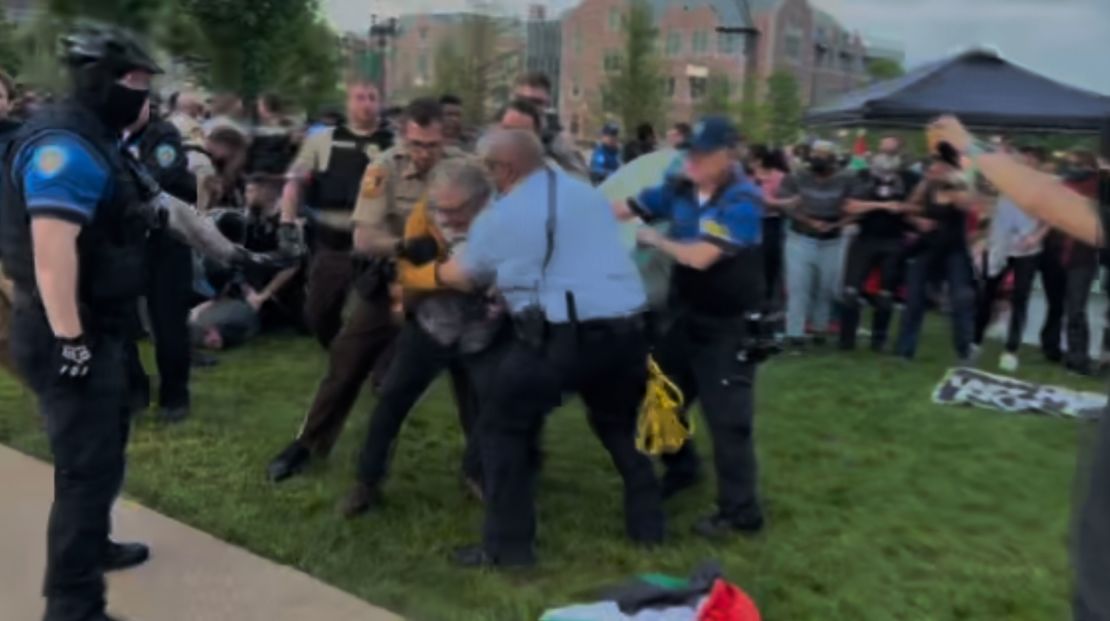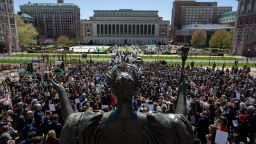As police cracked down on anti-war protests on college campuses across the US in recent weeks, among those arrested were a pair of silver-haired 65-year-old professors armed only with their cell phones.
Annelise Orleck was knocked to the ground and restrained with plastic handcuffs at a protest at Dartmouth College in New Hampshire. She later complained of whiplash.
Steve Tamari was tackled by officers and taken into custody at a demonstration at Washington University in St. Louis, an attack he said resulted in multiple broken ribs and a broken hand.
Each had been filming the protests in the moments before they were arrested. Both Orleck, who is Jewish, and Tamari, who is Palestinian American, said they were motivated to attend in part by a desire to support student protesters exercising their right to free speech.
Their stories illustrate a facet of the student-led protests that has received comparatively little attention: The role professors have played in the demonstrations, and the response by their administrations and police.
Orleck and Tamari are among at least 50 professors arrested at campus protests across the country, according to a CNN review of police records, court filings, and news reports. (Since April 18, more than 2,400 students have been arrested amid protests on more than 50 campuses.) In some cases, professors said they were actively participating in protests based on their own beliefs. Others said they attended to show support for their students.
In recent years, universities across the US have come under increasing pressure from conservative politicians and donors criticizing them as liberal bastions of “wokeness.” That pressure has heightened following the October 7 Hamas attack on Israeli civilians and the subsequent Israeli war on Hamas. Many conservative politicians and donors have accused campuses of tolerating or abetting antisemitism by allowing protests against the war, even as student protesters accuse the universities of ignoring what they call genocide. While university administrations uniformly say they are trying to allow free speech on campus while maintaining order and keeping students safe, critics say many schools too quickly turned to police action, suspensions, and other disciplinary measures to shut down protests.
At Emory University in Atlanta, an economics professor who attempted to intervene in the arrest of a protester was physically subdued by police when she did not immediately comply with an officer’s command to “get your ass…on the ground.”
In video of the incident, Caroline Fohlin’s glasses fall off as she is forced to the sidewalk and she can be heard telling officers, “You just hit my head on the concrete.” Fohlin was charged with disorderly conduct and simple battery against a police officer.
In New York, a newly retired Japanese history associate professor at Columbia University told the New York Times he had merely been taking photos of police officers assembling before raiding Columbia’s campus when he was arrested. Gregory Pflugfelder told the paper he didn’t comply with officers’ demands he go back into his building, but played no role in the protest.
Dr. Isaac Kamola, the director of the American Association of University Professors’ Center for the Defense of Academic Freedom, said professors being hauled off in handcuffs are “the viral moments” that garner attention, but that the threats to academic freedom on college campuses are more nuanced and run much deeper.

“You don’t see the moments that are more subtle, of faculty being removed from teaching, being sanctioned without due process,” he said. There’s a chilling effect where faculty are not sure what they can and can’t say. The problem is exacerbated, he said, by the increasing number of non-tenured faculty members who “feel incredibly vulnerable” about taking a public stance on a controversial issue such as the war in Gaza.
Increasingly, Kamola said, university administrators are calling in law enforcement to sort out what should be internal debates about the parameters of academic freedom.
“There’s been a normalization of having cops on campus,” he said.
Officials from several universities where professors were arrested in connection with recent protests declined to comment on individual cases. Broadly speaking, officials have said they are committed to free speech on campus, but that there are limits when it comes to safety and when it encroaches on the rights of other members of the campus community.
At Emory, which said May 6 it would move its commencement ceremonies off campus, President Gregory Fenves wrote to faculty members and students promising to review the events of April 25, when police removed a protest encampment. Fenves said the review would include reexamining “how Emory engages external law enforcement agencies.” But at the same time, he said that while Emory supports students and faculty in expressing their views peacefully, “We will not tolerate conduct that undermines those efforts.”
Some faculties have pushed back against leadership. On Wednesday, the University of Southern California’s faculty senate voted 21-7 to censure USC President Carol Folt and Provost Andrew Guzman over the removal of a protest encampment from campus and the use of Los Angeles police to arrest protesters, among other issues. On April 26, Columbia University’s senate stopped short of censuring President Minouche Shafik, but passed a resolution saying her administration had undermined academic freedom and violated due-process rights in calling in police and shutting down protests on that campus. On April 29 a group of faculty members donned yellow safety vests and linked arms to block the entrance to the students’ encampment on campus. Joseph Howley, an associate professor of Classics, said they did so to de-escalate tensions and to keep students safe “from troublemakers and police.”
In Los Angeles, associate professor Graeme Blair told CNN he was among “a line of 15 faculty members” at UCLA who joined a demonstration to support their students’ rights to protest. All the professors, Blair said, were “expecting to get arrested.” Though Blair himself was not arrested, at least four other UCLA professors were that day.
‘Got grandma’
Orleck, the? Dartmouth professor arrested earlier this month, said she was stunned to see the large police presence on campus on the evening of May 1.
“It was like it was an armed invasion,” Orleck, who is Jewish, recalled in a telephone interview with CNN. She described “this line of riot cops with helmets and batons,” and said she’d “never seen anything like it” in her more than three decades as a professor.
Orleck had attended what she described as a small, peaceful protest earlier in the day over a labor dispute that had been sponsored by the faculty and? Students for Justice in Palestine at Dartmouth. But after leaving for dinner, a colleague reached out to let her know things had grown more tense.
When she returned to the campus’ College Green that evening at about 8:30 p.m., she was joined by several other older women faculty. She said they believed police would never hurt them, and that they could safeguard student protesters by standing between them and the officers.
“And boy was I naive,” she said. “I won’t make that mistake again.”
Video captured at the event shows Orleck approaching police officers, saying “leave our students alone, they’re not criminals!” Orleck is then dragged beyond the police line and forced to the ground. She was zip-tied and arrested with 89 other people, including one other professor.
In a letter addressed to the Dartmouth community, university president Sian Leah Beilock stood by her decision to involve the Hanover Police Department, but wrote that she was “sorry for the harm this impossible decision has caused.”
In an Instagram post three days after the protest, Orleck wrote that officers called out “got grandma” as she was taken into custody.
Though Orleck did not consider herself an active participant in the protest, she said she shared the demonstrators’ concerns about the plight of Palestinians in the ongoing war. She was adamant that the entire demonstration was peaceful.

She said the student protesters were respectful and never engaged in antisemitic comments. She told CNN she was glad she was there, saying that she hoped her story brought attention to how violent the police response was to a peaceful demonstration of students. “I want to say some of my colleagues, particularly at Emory and Washington University, were treated much more brutally. I mean, really, really brutally. Yeah, I have – I have injuries, but, you know, mine will heal.”
One of the colleagues Orleck was referring to was Tamari, a Palestinian-American professor who was arrested April 27 during a protest at Washington University in St. Louis, Missouri.
Tamari did not respond to an interview request from CNN. His wife said in a post on X that he was not granting media interviews and that “we are asking for time to rest and heal.” Tamari, however, described his ordeal in a detailed statement his wife also posted on X.
The professor, who teaches at a university just across the state line from Missouri in Illinois, said he joined the April 27 protest at Washington University in hopes of both ending the war in Gaza and to “support and protect the students,” according to the statement.
Once there, he wrote, he was “body slammed and crushed by the weight of several St. Louis County police officers,” resulting in “multiple broken ribs and a broken hand.”
He assailed Washington University for paying “lip service” to free speech, “while they trample anything that might rattle the military-industrial complex to which they are so beholden.”

Protesters that day had been demanding that the university divest from Israel and cut ties with the Boeing Company, a defense contractor that has provided bombs used by the Israel Defense Forces in Gaza.
The university’s chancellor, Andrew Martin, responded to queries from the student newspaper about divestment with the single word, “No,” in an interview published March 6. The university hasn’t commented publicly on the demands since then.
‘Don’t hurt him’
As police swarmed Tamari that afternoon, a lecturer at Washington University in St. Louis, recorded the confrontation with his phone.
“Don’t hurt him,” Michael Allen, who teaches American cultural studies, can be heard yelling.
“They’re being extra brutal today out here,” Allen says aloud to himself. He also chided police with chants of “fascists go home,” and “shame on you,” as he continued to document the scene.
As Allen followed one zip-tied detainee being led toward a police van, a pair of officers told him to stay back.
“Alright, I’ll stay back,” Allen said, adding, “I’m a faculty member. I’m concerned about my students getting arrested.”
Seconds later, Allen himself was taken into custody. He told CNN he was following the officers’ orders to back up when he bumped into two other officers and was immediately arrested. The encounter was partially captured as his phone fell to the ground.
Allen said he received a letter from university officials two days later outlining various allegations against him and placing him on paid administrative leave, effective immediately. According to the letter, a copy of which was obtained by CNN, Allen was summarily “relieved of all job duties” and “prohibited from being on any part of the University campus.” He was even barred from meeting with students off campus, the letter states.
Among the allegations was that he helped set up an encampment on university grounds and ignored “multiple warnings” by police to disperse, resulting in his arrest for trespass. He denied both allegations in an interview with CNN.

“I not only had no involvement in creating the encampment,” he said, “I never set foot in the encampment.”
As for trespassing, Allen said, the orders to disperse given by the police were directed at people who did not have university IDs. Since he had one, he said, he did not believe the order pertained to him.
Allen said he felt blindsided and “completely unsupported” by the university.
“There was no attempt to even hear my side before writing that letter,” he said.
Chancellor Martin, who this semester co-taught a course on free speech at the university, issued a statement May 3 saying Washington University in St. Louis took the steps it “felt necessary to keep our campus safe” and “will not comment publicly about any of the specifics” of its discipline of students, staff or faculty.
Some professors have been arrested willingly. Bikrum Gill and Desirée Poets, both assistant professors at Virginia Tech, were among at least five faculty members supporting the student encampment on their campus who opted not to leave when police warned students the night of April 28 to clear out or face arrest.
“As faculty, what do you do? We decided to stay with them so they wouldn’t be on their own at that moment,” said Poets.
Both she and Gill have been teaching at Virginia Tech since the fall of 2018 and will come up for tenure soon. But they agreed they couldn’t let that affect their support for the protests.
“Students see what’s happening in Gaza and they’re saying we don’t want to normalize this. That informs us,” Gill told CNN. “If the price of tenure is to stay silent on Gaza, it’s not worth it.”





